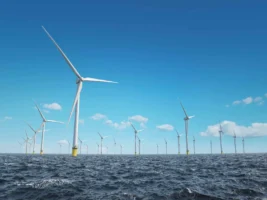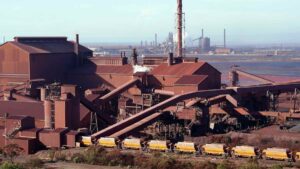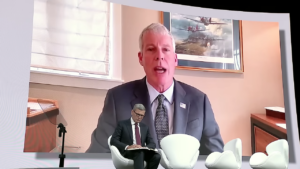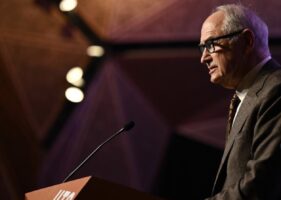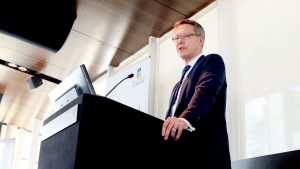Judging by his recent choice of presidential transport, Francois Hollande looks like he’s going to be putting climate change and the low-carbon economy back at the top of France’s political agenda. BusinessGreen reports today that the newly elected administration is already looking to revive the idea of putting a carbon tax on all goods imported from outside Europe – a move that was first proposed by Hollande’s predecessor Nicolas Sarkzoy, but dismissed by critics as overly protectionist. In an interview on FranceTV, the newly appointed French minister for “industrial revival,” Arnaud Montebourg, outlined the planned scheme, which would require importers of goods manufactured outside Europe to buy carbon permits from the EU ETS.
Montebourg said the move was aimed at protecting Europe’s industry from competitors in countries like China, which are yet to introduce CO2 emissions limits equivalent to Europe’s. And to avoid more accusations of protectionism, it has been suggested that revenues raised could be used to fund low-carbon projects in developing countries. But he said it remained to be seen whether the proposed tax, which was “already on the agenda of the European Commission,” would have more success this time around – admitting that it would probably require a change in Brussels’ philosophy. “The European Union will have to revise its totally liberal doctrine which is to say that it is forbidden to favour local industry,” he said.
Ceramic applauds Vic FiT recommendations
One company that is particularly happy about the Victorian Competition and Efficiency Commission’s recent recommendation that the state’s solar feed-in tariff be extended to include all small-scale low emissions and renewable energy generation technologies, is Ceramic Fuel Cells. Under the broadened terms recommended in the VCEC draft report, Ceramic’s BlueGen gas-to-electricity generators would become eligible for the FiT, making Victoria the first state in Australia to provide a subsidy for fuel cells – and bringing it up to speed with Germany and the United Kingdom, where the company’s highly efficient gas-to-power fuel cells are already getting a boost from government schemes.
The report, released on Friday, has recommended extending the standard solar PV FiT regime to include small-scale renewable and low emissions technologies of 100kW or less – ‘low emission’ being defined as 50 per cent or lower than the emissions intensity of the national electricity network; both recommendations that had been put forward by Ceramic in its submission and consultation with the VCEC. The Commission has also taken up Ceramic’s recommendation to simplify the process for connecting small-scale generators to the power grid.
The report also recommends a requirement that electricity retailers must offer a wholesale price-based feed-in tariff for distributed generation of 100kW or less – and notes that this value varies depending on time, location, and the type of generation technology, but estimates the current value at approximately 7 cents/kWh. Ceramic managing director Brendan Dow has welcomed recommendations as “a step in the right direction,” although he stresses that the proposal to only pay the wholesale rate for power does not reflect the benefits of increased network efficiency from distributed generation.
“We look forward to our ongoing consultation with VCEC and to the Victorian Government adopting the report and delivering a feed in tariff for our locally developed clean energy technology, and in the meantime we will continue to increase sales in offshore markets like Germany and the UK which already provide feed in tariffs,” Dow said. The Victorian government, which commissioned the VCEC report in January, will now seek submissions on its draft report by June 15, before making its final report in July.
Carbon credits planned for Brazil cap-and-trade
Brazil’s biggest securities exchange operator, BM&F Bovespa, has joined with Banco Santander to create carbon permits, similar to those used in the EU scheme, that will be available to be traded next year. Bloomberg reports that Brazil is following Europe’s lead in establishing a cap-and-trade system to limit carbon emissions, after Former President Luiz Inacio Lula da Silva promised to cut the nation’s emissions by at least 36 per cent by 2020 at the Copenhagen climate conference three years ago. Karen Suassuna, director of the Ministry of Environment’s Department of Climate Change, told an interviewer it was too early to say what policies would be put in place, or how they may affect Brazilian companies.
“We’ll have a cap-and-trade market next year,” Roberto Campos, director of treasury for Madrid-based Santander, said on Thursday in an interview. “We’re not going to reinvent the wheel. The idea is to adapt what we already have in Europe to the Brazil market.” According to Bovespa’s Guilherme Fagundes, manager of environmental products at the Sao Paulo-based exchange operator, the joint venture with Santander aims to make Sao Paulo Latin America’s first trade hub, where companies in other countries may buy and sell emissions credits. BM&F Bovespa already auctions carbon credits from select projects, Fagundes said. The company will accept bids June 12 for 530,000 carbon credits generated by a power project at the Bandeirantes landfill in Sao Paulo.


